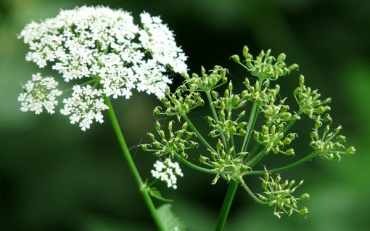Bishop's Weed
Other Names: Ajava Seeds, Ajowan, Ajowan Caraway, Ajowan Seed, Ajowanj, Ajwain, Ajwan, Ameo Bastardo, Ammi Commun, Ammi Élevé, Ammi glaucifolium, Ammi Inodore, Ammi majus, Ammi Officinal, Bishop's Flower, Bisnague, Bullwort, Carum, Carom, Espuma del Mar, Flowering Ammi, Grand Ammi, Aatrilal, Omum, Yavani, Hirz al-Shayateen, Rejl al-Ghorab, Riji al-Tair, Ptychotis ajowan
Bishop's weed is a plant. It is a small erect shrub and has soft, fine feathery leaves. The seeds are gray colored. Ajowan looks like wild parsley, similar to celery, caraway and cumin seeds and is native to India. The plant flowers in about two months and the fruit is harvested when the flower heads turn brown. They are pulled out, dried on mats and separated by rubbing with the hands or feet.
Special Precautions of Bishop's Weed
- Be careful not to confuse bishop’s weed (Ammi majus) with its more commonly used relative, Khella (Ammi visnaga). The two species do contain some of the same chemicals and have some similar effects in the body. But Bishop's weed is more commonly used for skin conditions, and khella is usually used for heart and lung conditions.
- When taken by mouth, bishop's weed might cause nausea, vomiting, and headache. Some people are allergic to bishop's weed. They can get a runny nose, rash, or hives. There is also some concern that bishop's weed might harm the liver or the retina of the eye.
- Bishop's weed can cause skin to become extra sensitive to the sun. This might put you at greater risk for skin cancer. Wear sunblock outside, especially if you are light-skinned.
- Pregnancy and breast-feeding: It’s UNSAFE to use bishop’s weed if you are pregnant. It contains a chemical called khellin that can cause the uterus to contract, and this might threaten the pregnancy.
- It’s also best to avoid using bishop’s weed if you are breast-feeding. There isn’t enough information to know whether it is safe for a nursing infant.
- Liver disease: There is some evidence that bishop’s weed might make liver disease worse.
- Surgery: Bishop's weed might slow blood clotting. There is a concern that it might increase the risk of bleeding during and after surgery. Stop using bishop’s weed at least 2 weeks before a scheduled surgery.
- Medications changed by the liver (Cytochrome P450 3A4 (CYP3A4) substrates) interacts with BISHOP'S WEED
- Medications that can harm the liver (Hepatotoxic drugs) interacts with BISHOP'S WEED
- Medications that increase sensitivity to sunlight (Photosensitizing drugs) interacts with BISHOP'S WEED
- Medications that slow blood clotting (Anticoagulant / Antiplatelet drugs) interacts with BISHOP'S WEED
Benefits and uses of Bishop's Weed are
- Potent painkiller.
- Digestive disorders, : bloating, gas, and constipation.
- asthma, chest pain (angina), kidney stones, and fluid retention.
- Some people apply bishop's weed directly to the skin for skin conditions including psoriasis and vitiligo : Bishop's weed contains several chemicals, including methoxsalen(Oxsoralen, Methoxypsoralen), a chemical used to make a prescription medication for the skin condition psoriasis.
- Ajowan is used in Ayurvedic herbalism and considered to have warming effects for cold conditions that debilitate.
- Ajowan is antispasmodic and relieves abdominal pain or distension. It is helpful for stimulating the appetite and enhancing digestion
- An old belief was that Ajowan seeds soaked in lemon juice and dried 7 times before ingested cured impotence.
- The boiled seeds were used to cleanse the eyes and cure deafness.
